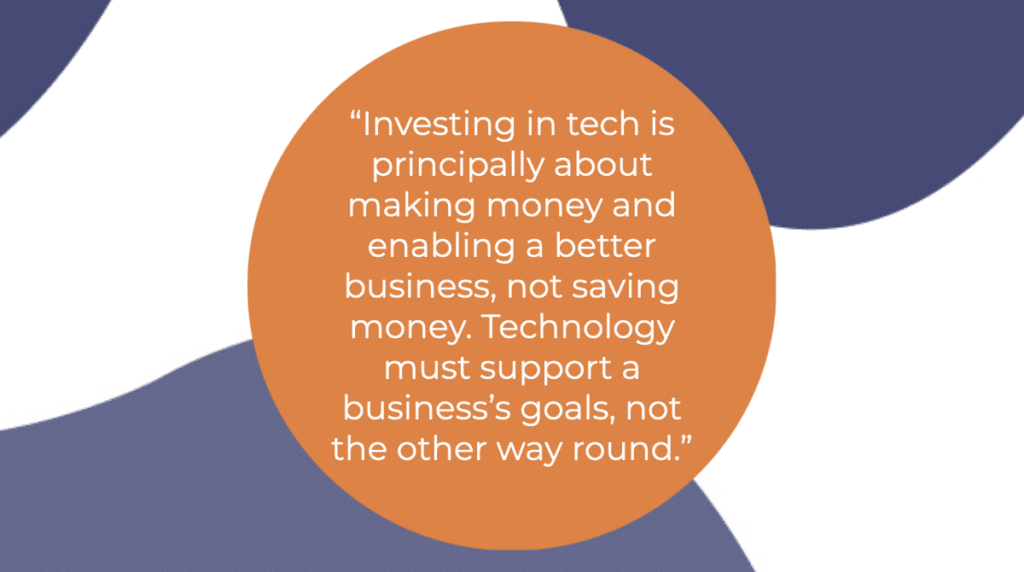The unique events of the past year challenged many wine businesses to review or reinvent themselves during the course of 2020 and 2021, with considerable success. As we look forward to a return to normality the question becomes how can it be sustained? If businesses are going to continue to develop the way they operate in pursuit of ongoing success, they will need to have the right management and support systems in place.
A conference panel discussion led by Richard Siddle (The Buyer) at the London Wine Fair on how the wine industry can leverage technology to become more efficient and profitable gathered together 4 industry leaders – Nick Martin (Wine Owners), Jonathan Harclerode (Bottlebooks) James Miles (Liv-ex) and Elliot Awin (ABS Wine Agencies).
The wine industry shift
According to Nick Martin, as more fine wine businesses turn to e-commerce to reflect the market’s behavioural shift, mastering your inventory management and fulfilment become critical.
Jonathan Harclerode from Bottlebooks looked beyond essential data mastering to the challenge of collecting and managing actionable content that helps to sell more wine.
“People are more and more confident and ambitious with digital. More investment is going into streamlining digital processes from producer through to retailer and removing hurdles in the process”.
Bottlebooks partner with Wine Owners to support the data and content distribution needs of producers, importers and merchants.
Going digital
Jonathan Harclerode considers that any business should re-evaluate their online strategy if they want to keep up with consumer trends.
“Even though we were digital, like the rest of the industry we also had to step back and look at where the market was going and orient ourselves in that direction”.
According to James Miles from Liv-ex, a lot of new merchants and startups are looking to come in and build new businesses around these technologies, and more traditional businesses should make the most of cloud based systems in order to be more efficient, reach a bigger audience and provide much better information and experience.
“Doing nothing just isn’t an option.”
ABS Wine Agencies is a great example of a business that is developing a successful online strategy.
“In terms of digital efficiency, we have to ask what is the role of an effective importer/agent/distributor? ” explained Elliot Awin, who signed up to the Wine Hub recently.
Elliot points to 3 different channels of flows that are important: information flow, stock flow and cash flow.
“For new startups, having to hold stock seems like such a waste when specialising in engagement and being able to sell to your customers, and not having to worry about cash flow and stock flow.”
That’s where their role as stockholder and lender of working capital became clear: ”The idea of having a system such that customers can see our stock and therefore allowing them to sell stock that they don’t ever own, and have the visibility so that they can sell whatever they like. The idea of a platform and consolidated warehousing for bigger companies that is going to create so much more engagement with consumers.”
Redefining the market
To Nick Martin’s point, investing in tech is principally about making money and enabling a better business, not saving money. Technology must support a business’s goals, not the other way round.
“That means flexibility of business processes, data that drives engagement and success, and improving the lives of people who work within a wine company.”
“Cloud computing has made it a lot easier for tech to reconfigure around evolving business models. We’re moving from the 1990s tech world view of ‘everything under one roof’ to a much more application-specific, connected, collaborative world where the effect of the network is becoming hugely significant. The effect on the global fine wine market will be redefining.”

Positive effect of data standardisation and automation
Content is fundamental in driving buyer engagement and online revenues. Harclerode reinforced that you can’t just start an online shop without content and collecting content without an actionable purpose may not deliver value. You have to look a bit more strategically at what stories you are trying to tell that resonate with and inform buyers.
Bottlebooks, for example, is standardising the way businesses exchange information and helps with the “orchestration” between businesses, which is critical in an industry that relies so heavily on relationships between its participants. To them, it is about solving the issue of standardisation, automation and focusing on the processes. When the processes break down that can come at massive cost to businesses. Technology provides the systemization so that people can focus on high value tasks.
James Miles concluded: “It’s quite an exciting time. Anyone with information can share it with everybody…It’s not just about cost saving, we will all become a lot more efficient and we can all focus on the things we’re best at and all jobs in that environment become more interesting. But more to the point it just allows us all to really become much bigger businesses and to provide a much better service and experience to our customers and that’s really exciting”.
Technology helps free up administrative time, reduces scope of errors, and connects you to your addressable market and sources of supply. Your business becomes much more scalable, growth requires less capital, and helps to shift the needle of net profit.
Learn how the Wine Hub can support your business growth here.